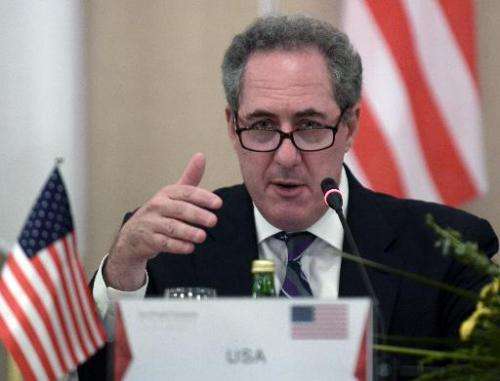US trade representative Michael Froman speaks to reporters during a press conference in Singapore on May 20, 2014
The United States wants China to break a logjam over a proposed WTO information technology pact in annual bilateral talks this week, the top US trade envoy said Monday.
China should show "real leadership" by helping to advance negotiations on the expansion of the World Trade Organization's Information Technology Agreement, US Trade Representative Michael Froman said.
Froman, who will join the US delegation at the Strategic and Economic Dialogue (SED) in Beijing on Wednesday and Thursday, said that the expansion of the ITA was high on the list of US trade priorities.
Froman said there had been some progress with China on the issue on the sidelines of the APEC finance ministers meeting in May and afterward, but "we're not there yet."
All members negotiating the update of the 1996 ITA, not just the US, believe China's offer is "insufficiently ambitious," and that is why the talks have been suspended twice last year, the lead US trade negotiator said in a conference call with reporters.
"This is an area where we think there is a real opportunity for China to show leadership—leadership in its role as chair of APEC this year—and to work at the SED to make concrete progress toward resolving our differences between the US and China in order to restart the negotiations."
The Asia-Pacific Economic Cooperation group of 21 members, which includes the US, Japan and Russia, has made ITA expansion a major goal.
Froman would not comment on the Financial Times report Monday that the standoff was over China's drive to exclude about 60 new product categories, including medical devices and next-generation silicon chips from the ITA.
But he suggested that if China showed more willingness to negotiate the ITA deal, it could help smooth the way to reach common ground on other troublesome issues between the world's two largest economies.
"Concrete progress would have positive spillover effects" on other negotiations, both bilateral and international, Froman said.
© 2014 AFP





















